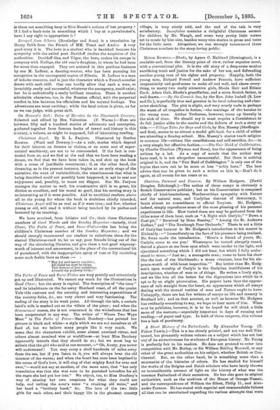MINOR Sroaies.—Rhoda, by Agnes C. Maitland (Remington), is a readable
and, from the literary point of view, rather superior novel, with a conventional plot. It is the old story of a desperate mother sacrificing truth and justice for the sake of her son, and defrauding another young man of his rights and property. Happily, both the young men, Richard Ferroll and Andrew Francis, have sufficient magnanimity and good-sense to make all end well, and above every- thing, to marry two really attractive girls, Rhoda Gair and Minor Cecil. Adam Gair, Rhoda's grandfather, and a stern Scotch father, is well drawn.—By the Cornish Sea, by the Rev. John Isabell (S. Low and Co ), is perfectly true and genuine in its local colouring and char- acter-sketching. The plot is slight, and very nearly ends in perhaps the worst of all tragedies in fiction,—the marriage of the heroine to the wrong man. Arthur Treleaven, however, turns up literally in the nick of time. We should say it mast require a Cornishman to do full justice alike to the merits and the defects of such a story as this.—Village Tales for Boys and Girls, by Mrs. Massey (Skeffingto and Son), seems to us almost a model gift-book for a child of either sex attending a Sunday-school. Mrs. hassey's stories teach religion in common life—virtues like unselfishness and self-sacrifice, &c.—in a very simple but effective fashion.—The Fair Maid of Coddrington, by Charlie Charlton (Wyman and Sons), has the appearance of being written by a lad. As a copy of novels that the author may have read, it is not altogether unsuccessful. But there is nothing original in it, and the "Fair Maid of Coddrington " is only one of the legion that turn out to be more or less "nobly born." The best advice that can be given to such a writer as this is,—Don't do it again, at all events for ten Tears or so.






































 Previous page
Previous page